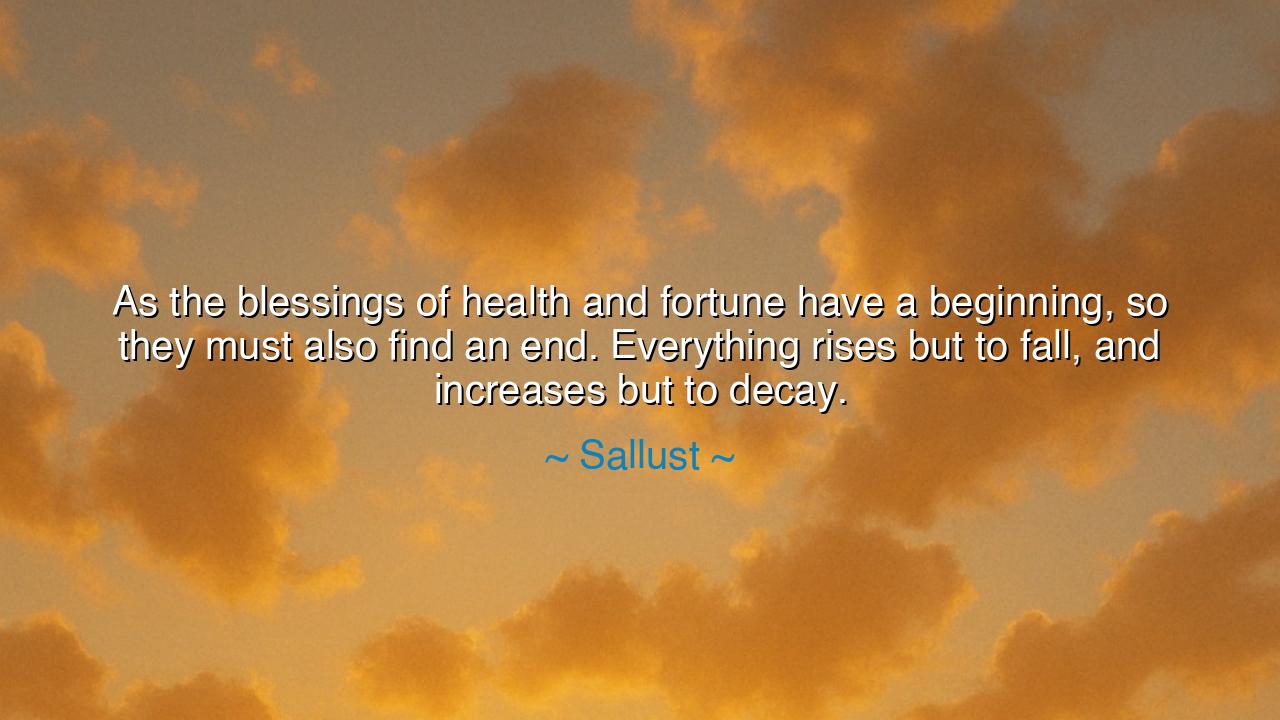
As the blessings of health and fortune have a beginning, so they
As the blessings of health and fortune have a beginning, so they must also find an end. Everything rises but to fall, and increases but to decay.






The words of Sallust, “As the blessings of health and fortune have a beginning, so they must also find an end. Everything rises but to fall, and increases but to decay,” echo through time like the tolling of an ancient bell — solemn, truthful, and eternal. In these lines, the Roman historian reveals the law of impermanence, the rhythm that governs all things born under the sun. Health, wealth, power, beauty, youth — all are transient. What begins in vigor ends in stillness, and what ascends to glory must, in its season, descend to dust. Sallust speaks not to sadden us, but to awaken us — to teach us that wisdom lies not in resisting the tides of life, but in understanding their flow and living nobly within them.
The origin of this quote can be traced to Sallust’s reflections on the rise and fall of Rome itself. Writing in the first century BCE, he watched with sorrow as the once-disciplined Republic, forged in hardship and honor, rotted beneath the weight of luxury and greed. The blessings of health and fortune, which had once made Rome mighty, became the very causes of its decay. Ease weakened the spirit; excess dulled the edge of virtue. In his eyes, Rome’s story mirrored nature’s unbreakable pattern: every dawn must yield to dusk, and every empire, no matter how grand, must one day crumble into memory. His words, though born of a particular age, were meant for all ages — for the same fate awaits all who forget the humility that must accompany prosperity.
To say that “everything rises but to fall” is to recognize the sacred balance at the heart of existence. The ancients knew this truth well. The Greeks called it Ananke — necessity, the force that binds even gods to the cycle of creation and dissolution. The Buddhists later spoke of impermanence, teaching that attachment to what must pass is the root of suffering. And in every tradition, from the desert prophets to the Stoic philosophers, this wisdom resounds: that mortality is not tragedy but design, and that only by embracing it can one live wisely. Sallust, like a Roman prophet, reminds us that decline is not failure — it is simply the turning of the wheel, the return of all things to their origin.
History offers countless mirrors of this truth. Consider the life of Alexander the Great, who conquered the known world before his thirtieth year. His fortune seemed boundless; his health, indestructible; his fame, eternal. Yet at the height of his power, in Babylon, he fell to fever — a reminder that even the greatest of men is but mortal clay. His empire, built on conquest, fractured within months of his death. So it is with all things that rise too high without balance — they are subject to the law that governs the stars and the seasons: growth and decay, triumph and fall, life and death.
Yet Sallust’s words are not meant to breed despair, but perspective. If all blessings fade, then we must cherish them deeply while they last, without clinging to them as if they were eternal. To love health is wise, but to depend upon it is folly. To enjoy fortune is proper, but to worship it is ruin. True peace comes not from denial of change, but from harmony with it. Just as the wise farmer does not curse the coming of winter, but prepares his store and rests his field, so too must we learn to live with the seasons of the soul — to work when the time is ripe, to rest when the time is done, and to meet decline not with fear, but with grace.
Sallust’s insight also teaches us humility. The proud man, who believes his strength will never fail, is already decaying. The greedy man, who hoards riches as though time itself can be purchased, is already poor in spirit. But the one who accepts impermanence as law becomes serene. For he knows that when fortune leaves, character remains; when youth fades, wisdom blossoms; and when life ends, the soul — the eternal essence — continues its journey. In this way, what decays in matter is reborn in meaning.
The lesson of Sallust’s words, therefore, is not to resist the fall, but to rise with dignity and to decline with grace. Care for your health, but know it will one day falter; cherish your fortune, but use it for good before it departs. Build your life as a noble flame — not fearing that it will one day go out, but ensuring that while it burns, it gives light. For it is not how long the flame endures that matters, but how brightly it shines.
So let his wisdom endure like the marble of Rome itself: all things that rise will one day fall, but the virtue with which we live endures beyond the ruin. The strong man accepts decay as part of the divine order, and the wise man lives not for permanence, but for purpose. Health fades, fortune passes, and life itself ends — yet honor, courage, and compassion outlast the ages. To live in awareness of this truth is not to mourn the fall, but to make the rise worthy of remembrance.






AAdministratorAdministrator
Welcome, honored guests. Please leave a comment, we will respond soon